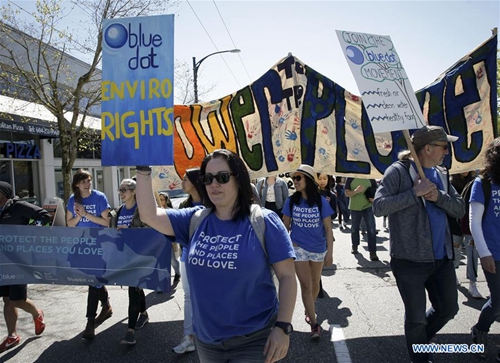COMMENTS / INSIDER'S EYE
Green finance can fix its Groucho Marx problem by increasing appeal and transparency

Photo:Xinhua
When it comes to clientele, every club confronts a Groucho Marx problem. The comedian famously quipped that he avoided establishments that would have him as a member. Green-finance pledges have had to wrestle with a similar dilemma in deciding whether to prioritize quantity of supporters or quality.Principles for Responsible Investment (PRI), launched in 2006 with the support of the United Nations, proudly states that it has signatories who control $86 trillion of assets. Yet many attendees at its own conference in Paris earlier this month see the claim as slightly embarrassing. If all that investment was being deployed in line with environmental, social and governance principles - as PRI membership implies - climate change would be under control. Instead, only 2 percent of participants reach the PRI's preferred level of green disclosure and scenario-planning.
This should give pause for thought as the United Nation's Climate Action Summit kicks off in New York this week with two new PRI-style pledges. It's great that 12 significant asset owners like CalPERS and Allianz are pledging to make their activities carbon neutral by 2050.
It's also good that 130 banks including Santander and Citigroup are signing up for the newly launched Principles for Responsible Banking, to align lending with the goals of the 2015 Paris Agreement and limit global warming. But that represents only a third of the global banking system - big names like JPMorgan, Bank of America and HSBC aren't yet on board. One refusenik told Breakingviews it wasn't joining because executives feel that pledge inflation has devalued the currency of participation.
The solution is twofold. First, echoing the PRI's threat to eject 50 laggard signatories, boot out unworthy members. Second, establish a VIP area that is sufficiently alluring.
Here Natixis may have supplied the missing piece of the puzzle. The French investment bank said on Monday that it would voluntarily divide 127 billion euros ($139.6 billion) of loans into seven different buckets based on their green credentials, with the risk weighting of the best assets cut in half while the worst rise by a quarter. By publicly and proactively tinkering with capital requirements for each type of loan, the 12 billion euro group is providing its own incentives instead of waiting for regulators to step in. If Natixis-style transparency were to be made mandatory for fellow lenders that signed the Principles for Responsible Banking, green finance's VIP area could become enticingly busy.
The author is George Hay, a Reuters Breakingviews columnist. The article was first published on Reuters Breakingviews. bizopinion@globaltimes.com.cn


